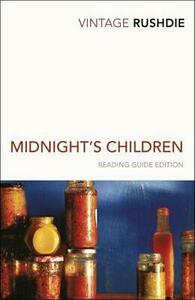You need to sign in or sign up before continuing.
Take a photo of a barcode or cover
challenging
funny
mysterious
slow-paced
I really wanted to get into this book, but the narrative style was difficult to follow. The main character jumps around a lot, brings up a subject only to save it for later, and seems to dwell on analyzing his situations rather than painting a picture.
Midnight's Children is widely acclaimed, having won the Booker of Bookers, among other accolades. The acclaim seems to lie in the word play and metaphor - the events in the lives of the Midnight's Children themselves as they relate to India's political changes.
To those ends it is impressive. The narratives ultimately do come together, and while you may spend the first portion of the book wondering what the emotion impact is supposed to be, it will make sense before the end.
I'd recommend this book to anyone with an interest in history of modern India. That and time to put in the effort--this book requires focus if you want to get the full picture.
Midnight's Children is widely acclaimed, having won the Booker of Bookers, among other accolades. The acclaim seems to lie in the word play and metaphor - the events in the lives of the Midnight's Children themselves as they relate to India's political changes.
To those ends it is impressive. The narratives ultimately do come together, and while you may spend the first portion of the book wondering what the emotion impact is supposed to be, it will make sense before the end.
I'd recommend this book to anyone with an interest in history of modern India. That and time to put in the effort--this book requires focus if you want to get the full picture.
I tried to read this for a book club, but had a difficult time getting into it, not to mention buying a copy during a pandemic. While I can appreciate Rushdie’s talent, this style is decidedly not for me.
Didn't finish it...library book due before done so bought used book, lost it after 2 days. I guess I wasn't meant to read this book. Hard to get in to.
adventurous
challenging
funny
informative
slow-paced
My favorite book of the year is also the one I have been most intimidated to reflect on. Midnight’s Children is the kind of multi-generational, ostentatious, darkly funny novel that sets the literary agenda for an entire nation. Indeed, India is very much the focus here, and its recent history is explored metaphorically through the life of Saleem Sinai, one of 1,001 “midnight’s children” who were born within the first hour of India’s independence from British rule. Each one is endowed with a supernatural ability, and Saleem is able to create a sort of telepathic radio network between all of them. However, far from embracing the vanguard role it seems he is destined for, Saleem faces lifelong existential anguish at his symbiotic connection with India’s tumultuous development. The schisms and fractions within the government correlate to physical cracks in his skin, a literal body politic. Eventually, ambitions of grandeur give way to his own struggle for independence from fate, no matter how insignificant he becomes as a result. Rushdie’s masterpiece feels every bit as foundational as The Thousand and One Nights or the stories of Jorge Luis Borges (overt influences), but with an extra helping of libidinous and ironic humor. So why am I reluctant to talk about it? Despite its length, everything in Midnight’s Children feels essential, and to attempt to fit its treasures into a blurb or list item seems obscene. Any summary will be woefully inadequate. Rushdie says it best: “To understand just one life you have to swallow the world.”
Saleem Sinai, the protagonist/narrator of Midnight's Children, says this towards the beginning of the book: To understand just one life, you have to swallow the world -- and maybe that's my problem with Midnight's Children.
Approach anything with a Pulitzer/Booker Prize label with caution, as I try to tell myself from time to time, but the double whammy of magical realism and the history of India made me break that rule of thumb. Besides, it's not like I haven't enjoyed Pulitzer/Booker Prize winners in the past (I'm a fan of Margaret Atwood's The Blind Assassin and Yann Martel's Life of Pi). So I gave this a shot and, well, it didn't turn out so well.
Instead of telling the story of Sinai and how his life mirrors that of modern India (since they were born on the same day and at the same time), Senai, as a narrator, would go off to tell the story of every single living member of his family. So we get to hear about his grandfather, grandmother, parents, sister, neighbours, caretakers, cousins, and everybody in between. Sinai was a part of India's history the way Forrest Gump was a part of the US'. But it was a tough book to get through because, whatever that you read in the synopsis, about how a boy is born at the stroke of midnight with telepathic powers and a powerful sense of smell, doesn't actually kick in until about 250 pages into the story.
In short, I can't say it was a bad book, because it obviously isn't. It just isn't my cup of tea, that's all. The characters were strong enough to carry me to about 450 pages, despite the story, and if you are patient enough to sit through Rushdie's ramblings, then this is the book for you.
Approach anything with a Pulitzer/Booker Prize label with caution, as I try to tell myself from time to time, but the double whammy of magical realism and the history of India made me break that rule of thumb. Besides, it's not like I haven't enjoyed Pulitzer/Booker Prize winners in the past (I'm a fan of Margaret Atwood's The Blind Assassin and Yann Martel's Life of Pi). So I gave this a shot and, well, it didn't turn out so well.
Instead of telling the story of Sinai and how his life mirrors that of modern India (since they were born on the same day and at the same time), Senai, as a narrator, would go off to tell the story of every single living member of his family. So we get to hear about his grandfather, grandmother, parents, sister, neighbours, caretakers, cousins, and everybody in between. Sinai was a part of India's history the way Forrest Gump was a part of the US'. But it was a tough book to get through because, whatever that you read in the synopsis, about how a boy is born at the stroke of midnight with telepathic powers and a powerful sense of smell, doesn't actually kick in until about 250 pages into the story.
In short, I can't say it was a bad book, because it obviously isn't. It just isn't my cup of tea, that's all. The characters were strong enough to carry me to about 450 pages, despite the story, and if you are patient enough to sit through Rushdie's ramblings, then this is the book for you.
I think that Slumdog Millionaire will help many become more curious about India. This brilliant book is a must for those searching to understand.






